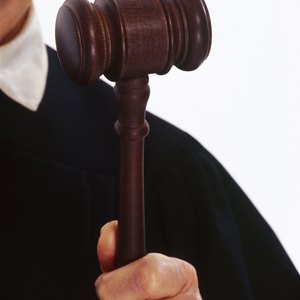
If you have a relative who died and owned shares of stock, you cannot simply claim them. Instead, the shares automatically become part of the decedent's estate and will be distributed among the heirs and beneficiaries. Some times this is done through the probate process. If you believe the shares are rightly yours, you may advocate your position before a probate judge.
Initiating Probate
You can initiate the probate process by delivering a certified copy of the decedent's death certificate, and a copy of the will to the clerk of the probate court with jurisdiction over the decedent's residence. The probate judge will appoint an executor to administer the decedent's estate. Normally, a judge appoints the executor named in the will, although he is not obligated to do so. Often the executor has already been designated by the decedent.
Probate Hearing
The probate hearing is designed to allow any party with legal standing to contest the will; or if the decedent died without a valid will, the distribution of property under intestate succession laws. You have legal standing if named as a beneficiary in the will, or if you stand to inherit property if the will is declared invalid or its language is interpreted in a particular way. A contestant may hire an attorney and subpoena witnesses. A party with legal standing may also seek the removal of an executor at a probate hearing.
The Executor
The estate executor files an income tax return on behalf of the estate, cataloging estate property, liquidating assets when necessary, and distributing assets to heirs as directed by the probate court. The executor is legally bound by the fiduciary duties of loyalty and care, and is subject to civil and criminal liability for mismanagement of estate assets.
The Living Trust
A grantor may place assets into a living trust, a device that transfers control over the assets to a trustee, who distributes these assets to beneficiaries in accordance with terms set forth in the grantor's trust deed. Assets can be distributed gradually, or in lump sum. When the grantor dies, these assets do not enter probate -- the trustee may continue to distribute assets just as he did before the grantor died.
References
- awyers.com: The Simple Living Trust
- Lawyers.com: Probate
- New York Life: Overview of the Probate Process
- Federal Trade Commission Consumer Information. “Debts and Deceased Relatives.” Accessed March 4, 2020.
- The Judiciary State of Hawai‘i. “Hawai'i Probate Rules.” Accessed March 4, 2020.
- Virginia Law. “Code of Virginia, § 64.2-452. How Will May Be Made Self-Proved; Affidavits of Witnesses.” Accessed March 4, 2020.
- Utah Courts. “Civil Terminology for Utah Interpreters,” Pages 20-21. Accessed March 4, 2020.
- Iowa Trust Code. “Chapter 633A,” Page 20. Accessed March 4, 2020.
- Utah Code. “Employment of Appraisers,” Page 24. Accessed March 4, 2020.
- The Superior Court of California, County of Santa Clara. “Closing and Distributing the Probate State." Accessed March 4, 2020
- Michigan Legislature. “700.3801 Notice of Creditors.” Accessed March 4, 2020
- Alaska Court System. “How Long Does a Creditor Have to Make a Claim Against the Estate?” Accessed March 4, 2020.
- Internal Revenue Service. “Filing Estate and Gift Tax Returns.” Accessed March 4, 2020.
- The Superior Court of California, County of Santa Clara. “Closing and Distributing the Probate State." Accessed March 4, 2020.
- New York State Unified Court System. “When There Is No Will.” Accessed March 4, 2020.
Writer Bio
David Carnes has been a full-time writer since 1998 and has published two full-length novels. He spends much of his time in various Asian countries and is fluent in Mandarin Chinese. He earned a Juris Doctorate from the University of Kentucky College of Law.

